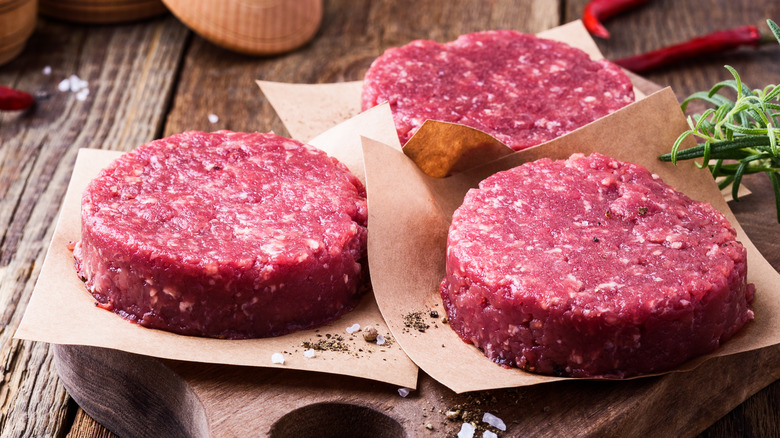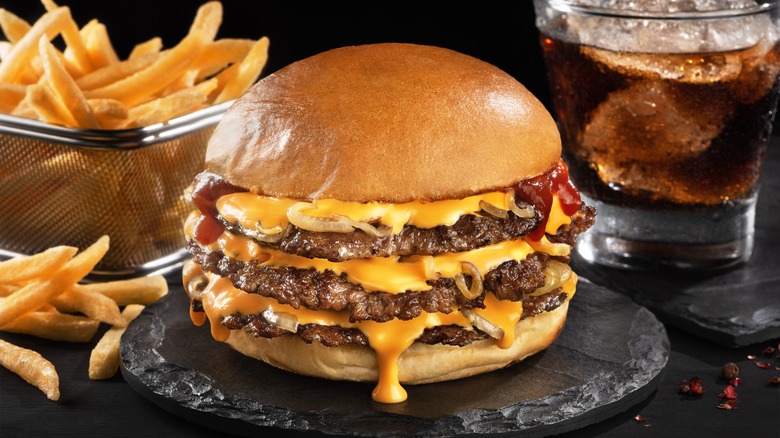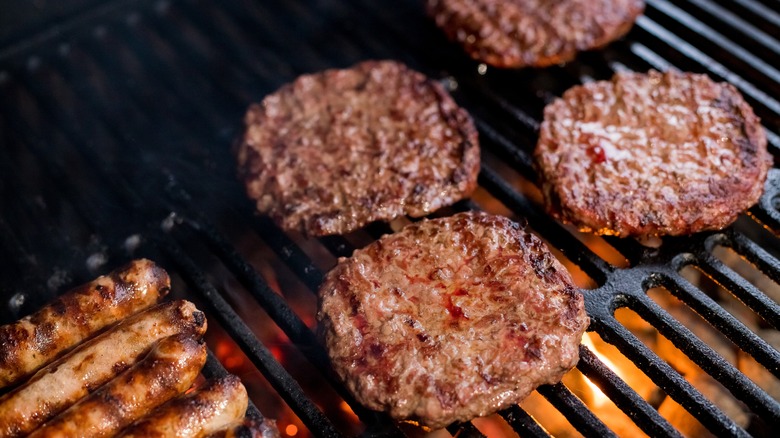How Much Your Burger Patties Should Actually Weigh
If you imagine biting into a succulent, meaty burger, chances are you're picturing something that resembles the burger emoji, with a single juicy patty, cheese, and perhaps a couple of extra toppings or sauces. It's probably a quarter-pounder, which is pretty much the perfect size for most buns, and gives an optimal meat-to-bread ratio. It's also a great size for cooking, thick enough to remain moist in the center while still developing a delicious charred crust on the outside.
A quarter-pounder weighs four ounces and makes for the ultimate homemade all-American cheeseburger. But there are a number of factors that determine what makes a good burger, and different weights of meat can be used for different styles and occasions. For example, mini sliders weigh in at around two ounces and are ideal as snacks for potluck parties or younger children — whereas you might want to go for larger burgers, such as a third-pound (5.3 ounces), for those with larger appetites at a relaxed afternoon barbecue.
But when making burgers, it's not just about how much beef you want to eat. The weight of the patty affects the appearance, cooking time, texture, taste, and overall eating experience of the burger. And then, of course, you'll need to bear in mind the difference between what the beef weighs when it's raw, and what it weighs after it's been cooked since meat shrinks during cooking. Still, for standard, best-cookout-of-your-life burgers, aim for four ounces per patty.
Bigger burgers are juicy but smaller patties mean more crust
Burgers are about personal preference, and every style has advantages and disadvantages. Thin patties cook faster and develop a great crust, but there's a chance they could overcook or dry out, so you need to keep a close eye on them while cooking. Six-ounce patties may seem ideal for meat lovers, and can certainly be especially juicy, but they can be trickier to cook evenly because of their thickness.
If you want more meat, but prefer the crust on thinner patties, then it's often worth cooking more patties that weigh less, and doubling or even tripling the number you layer on a single burger. For example, if you're making smash burgers, you could put two, two-ounce patties on each bun for a quarter-pounder weight but with more texture. Or if you fancy a weighty six-pound burger but don't want to risk the incredibly thick patty burning on the outside but remaining undercooked within, then try using two three-ounce patties instead.
Whichever style you prefer, make sure the bun you choose is up to the job. Though popular, brioche is the worst bun for burgers, according to Anthony Bourdain, who preferred soft potato buns, which are less likely to disintegrate under the juicy onslaught. Squishier buns can work for thinner burgers, but you'll want something studier for thick meaty patties; toasting the bun helps maintain the structural integrity and also adds a nice flavor.
Form burger patties to allow for shrinkage when cooking
The weight of burgers refers to the uncooked weight, so it's worth remembering that the weight after they've been on the grill could be quite different. Depending on the fat content and length of time it's on the heat, meat shrinks by around a quarter once it's cooked. For a traditional beef burger, you'll want to be using something like chuck steak that's 80% meat and 20% fat. So when you're cooking a quarter pounder, you won't actually be eating a full four ounces of beef; it could be more like three ounces or even slightly less.
When shaping patties, you need to allow for this shrinkage. Form them slightly wider than the size you want them to be once cooked. And if you're going for a thicker patty, making a dimple in the center can prevent it from shrinking or even bulging into an unwieldy shape; try pressing the middle with your fingers, so it's around a quarter-inch thinner than the edges.
If you're using good beef, there's no need to use any additional ingredients such as eggs, breadcrumbs, or onions in your mix. The only two ingredients Bobby Flay uses to season his burgers are salt and pepper, and who are we to argue with the experts? Keep the seasoning simple, and salt the patties right before they hit the grill for the best texture and juiciest results, no matter what they weigh.



